16 Systems Engineer Resume Examples
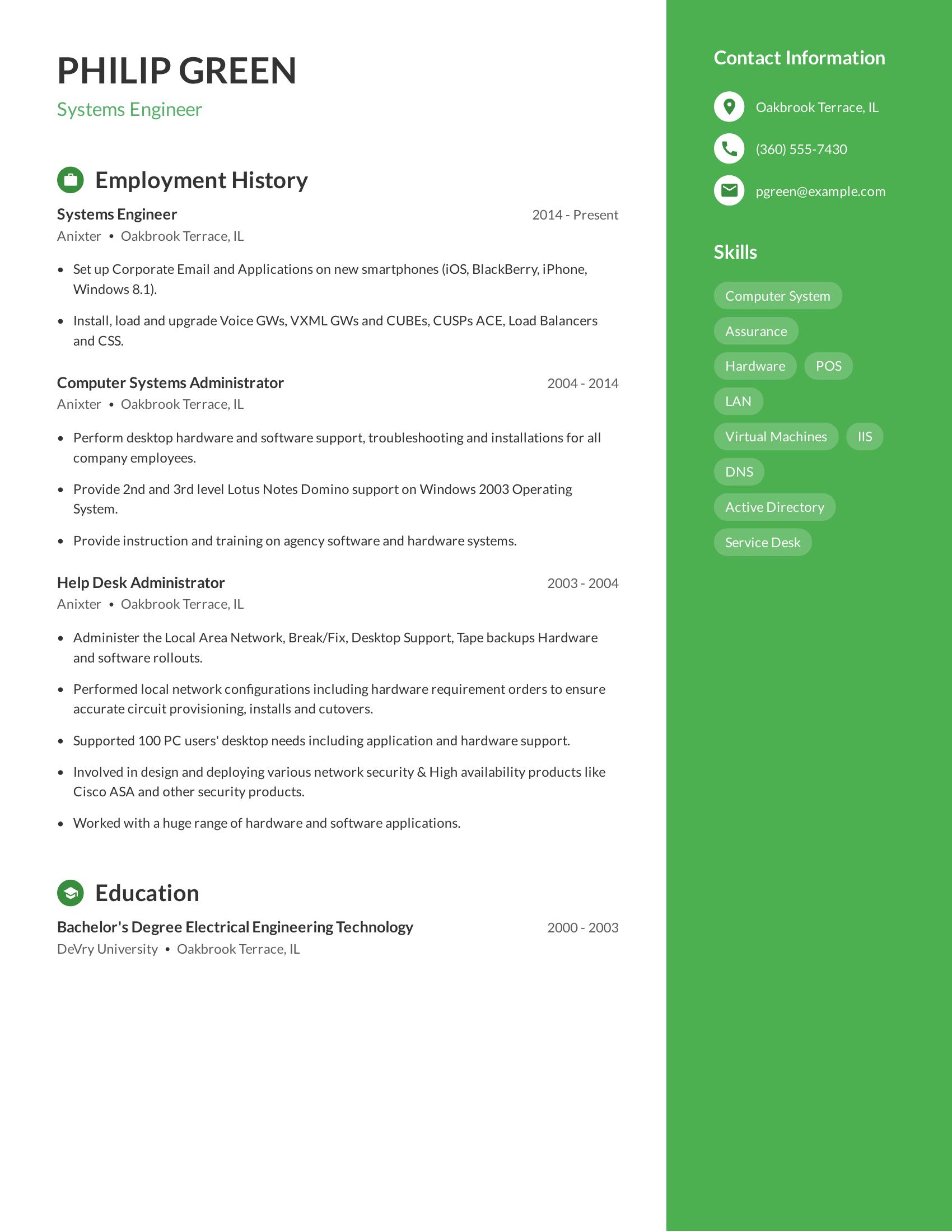



Systems engineer resumes should highlight technical skills, relevant job experience, and educational background. Important elements include a clear job history with specific responsibilities, technical proficiencies, and certifications. Experience in systems installation, troubleshooting, network configurations, and software support is crucial. Education should emphasize relevant degrees and institutions attended. Contact information should be easy to find.
This resume effectively includes specific job roles and responsibilities, showcasing the candidate's experience in systems engineering, computer systems administration, and help desk support. It lists technical skills such as LAN, DNS, Active Directory, and experience with various hardware and software applications. The educational background with a degree in electrical engineering technology from DeVry University is present and relevant. Contact information is clearly provided at the end.

Consultant systems engineer resumes should highlight experience with system configuration, administration, and troubleshooting. They should include specific technical skills such as knowledge of UNIX, Linux, Windows, and various networking protocols. Experience with hardware setup and software installation is crucial. Additionally, the ability to maintain databases, handle security configurations, and manage IT projects is important. A good resume in this field demonstrates a track record of solving complex technical issues and supporting IT infrastructure efficiently.
This resume includes detailed experience in configuring labs, performing system administration on UNIX servers, and managing various networking protocols. The candidate has a history of maintaining databases, handling backups, and resolving technical issues both remotely and on-site. The resume also shows experience with multiple operating systems like RHEL, Solaris, and Windows. Additionally, it mentions supervising and training new technicians, which indicates leadership capability. This breadth of experience aligns well with the requirements for a consultant systems engineer.
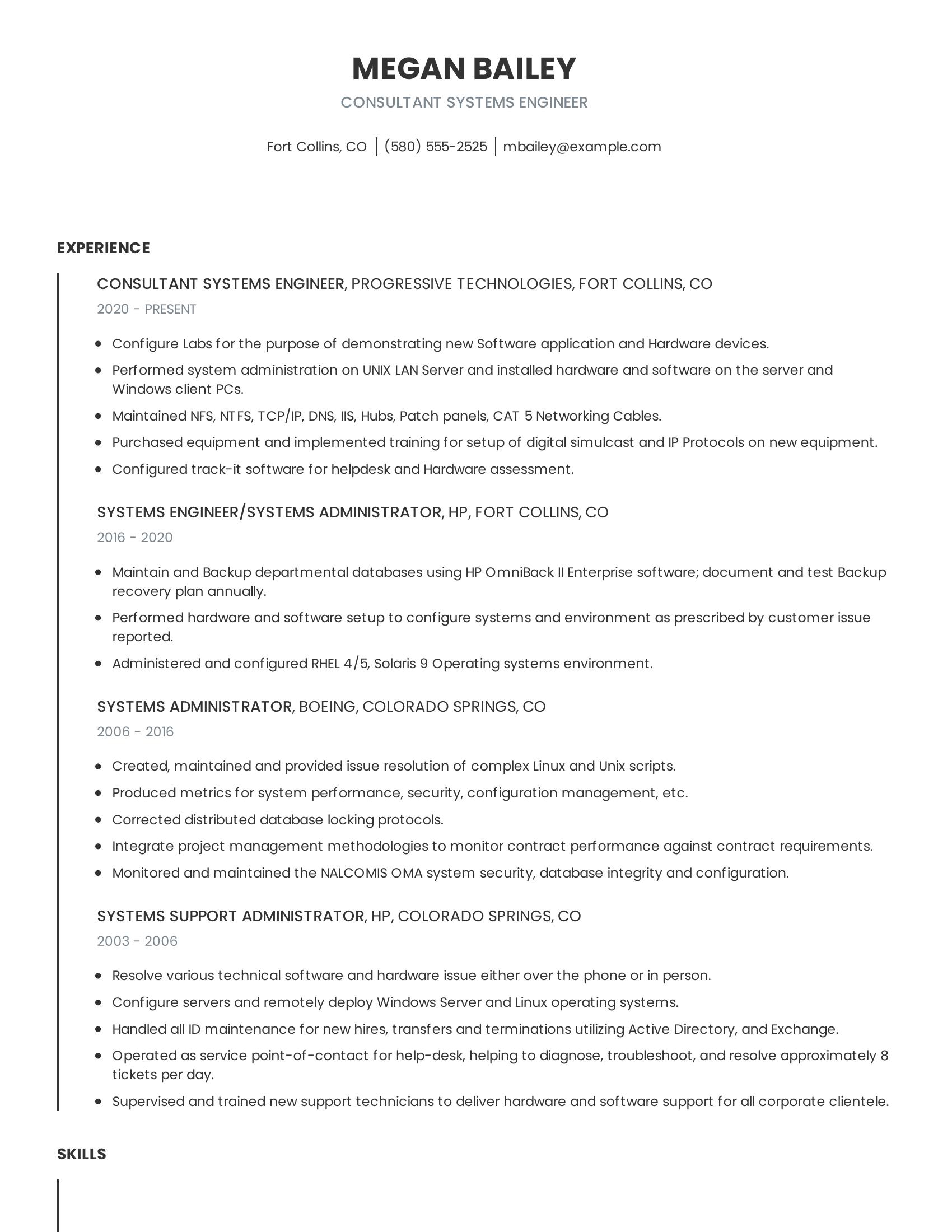
Technical systems engineer resumes should include clear and concise details about professional experience, technical skills, and education. A good resume highlights relevant job roles, specific tasks performed, and technologies used. It should also mention certifications or specialized training. Contact information must be current and correctly formatted.
This resume includes comprehensive job experience with notable employers like Stanford University and Lockheed Martin. It outlines tasks such as fiber infrastructure design, system administration, and software/hardware evaluation. The resume lists a range of technical skills including Linux Red Hat, AIX, and Windows NT Server, alongside a relevant educational background in electrical engineering.
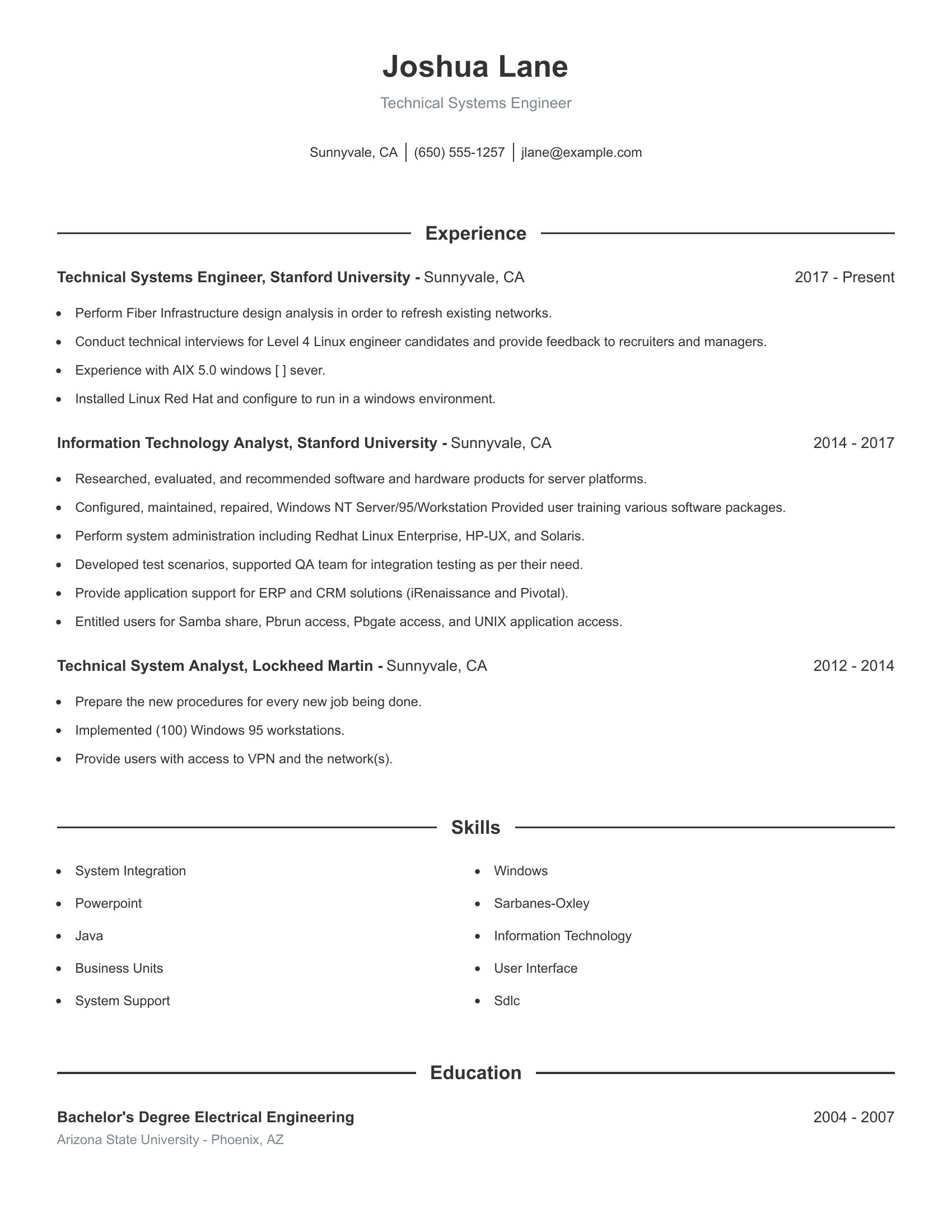
A good senior systems engineer resume should showcase experience with system design, implementation, and troubleshooting. It should highlight technical skills in various operating systems, programming languages, and software tools. The resume should also reflect the ability to work on complex projects, manage teams or client interactions, and provide technical support.
this resume includes those specifics by listing detailed experiences like working with developers to correct software risks and managing end-user profiles. It highlights technical support roles for Novell and Unix LANs and demonstrates expertise in troubleshooting using Linux Bash. It also shows experience in building 3-D CAD Models and creating T-SQL queries for product inventory management. The resume includes valuable skills such as Veritas System Performance and TCP/IP, which are crucial for a senior systems engineer.
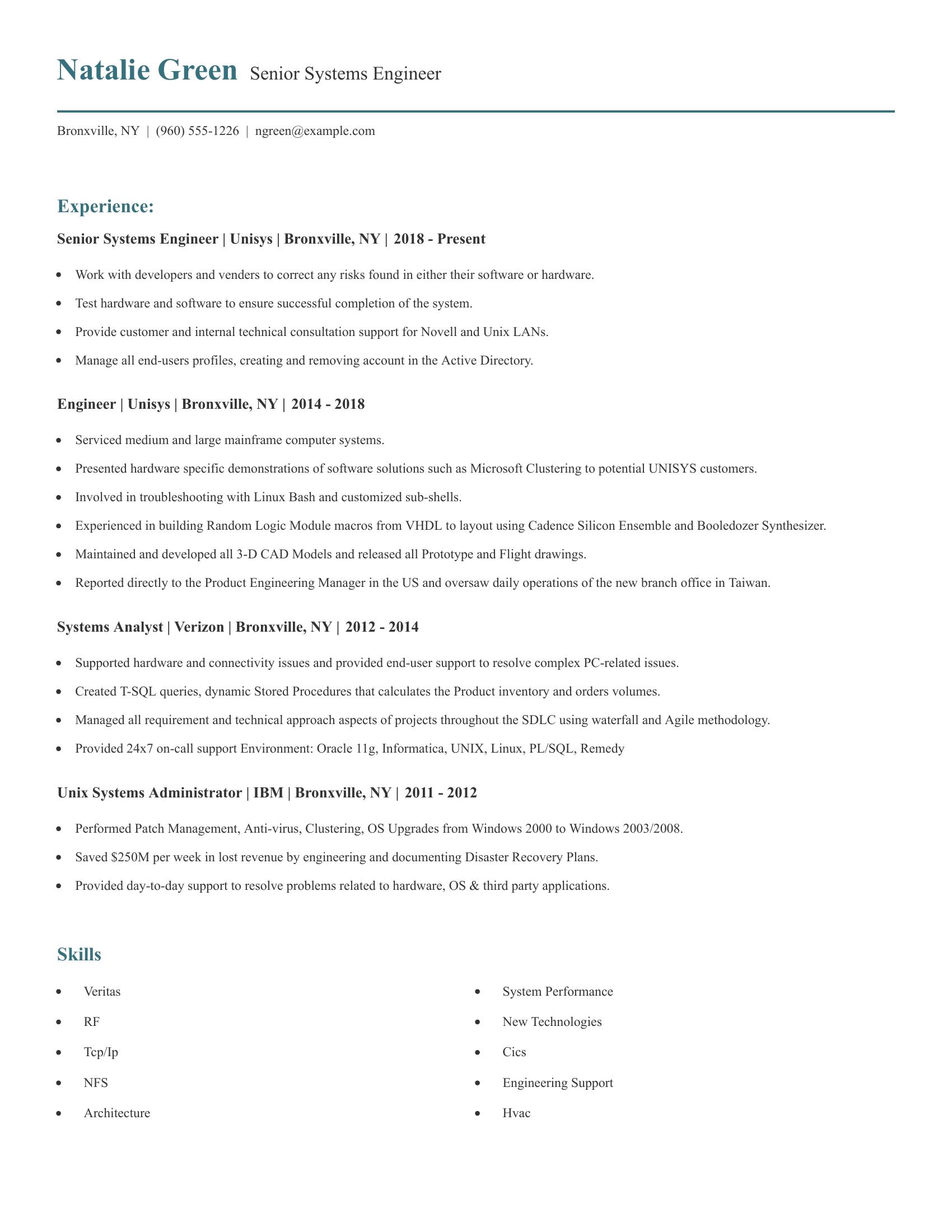
Systems support engineer resumes should highlight technical skills, experience with various systems and software, and the ability to troubleshoot complex issues. Important elements include contact information, a clear list of relevant skills, and detailed employment history that showcases specific responsibilities and achievements in previous roles. Education background should also be included to demonstrate foundational knowledge.
This resume includes specific technical skills like troubleshooting, system support, and experience with CRM and various operating systems. The employment history is detailed, showing roles at major companies with specific tasks such as scheduled maintenance, hardware upgrades, and LAN troubleshooting. The education section lists a bachelor's degree in computer science, providing evidence of formal training in the field.
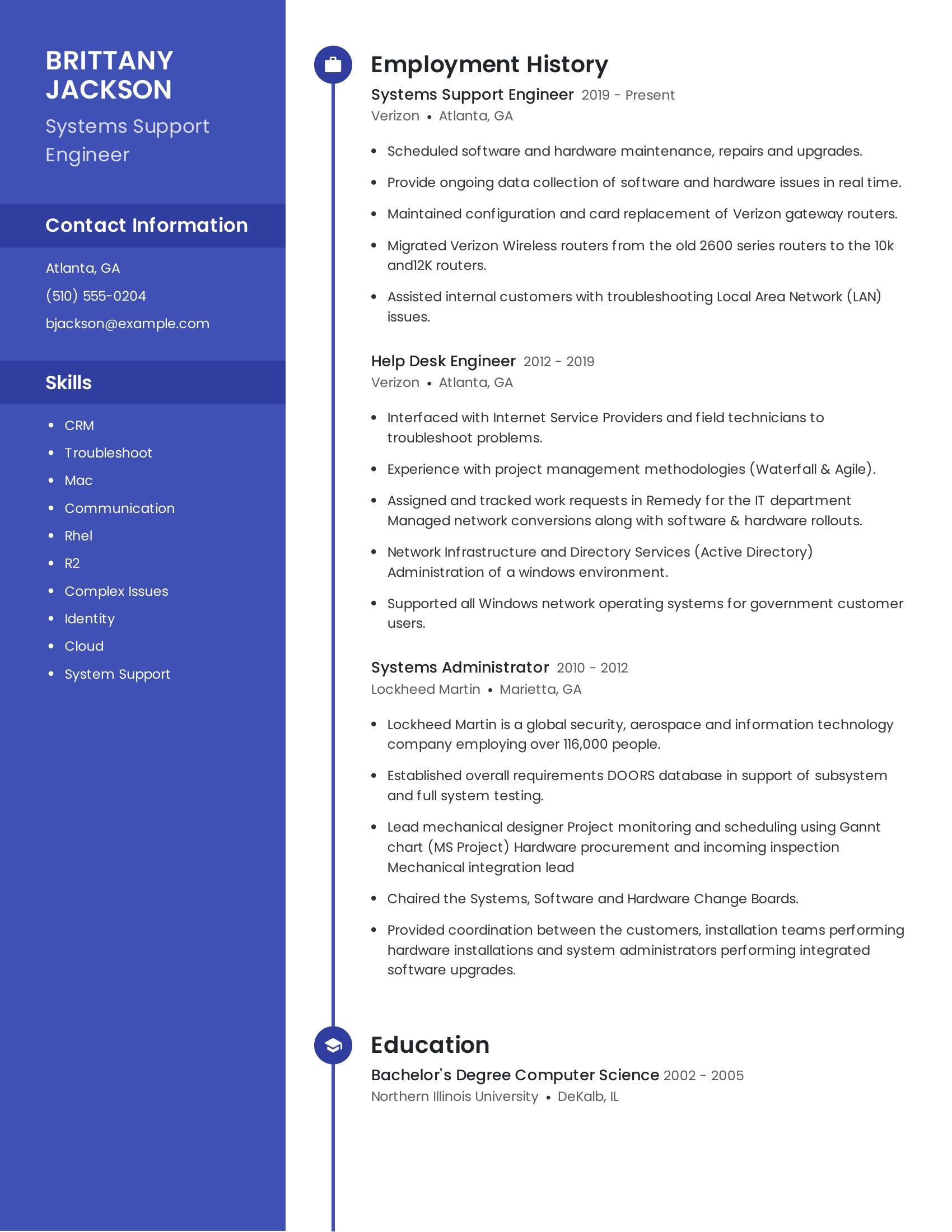
Systems engineer/systems administrator resumes should highlight technical skills, work experience, and education. They must list specific technologies and tools like ERP, AWS, and database management. Clear job responsibilities showing achievements and problem-solving in system administration are crucial. The resume should include contact information, employment history with dates, and relevant education credentials.
This resume effectively showcases the necessary elements. It lists technical skills like network security, Hyper-V, and VPN. The work experience section details responsibilities at each job, such as automating data loads and migrating databases. The education section includes a relevant degree in electrical engineering. Contact information is clearly provided at the top.
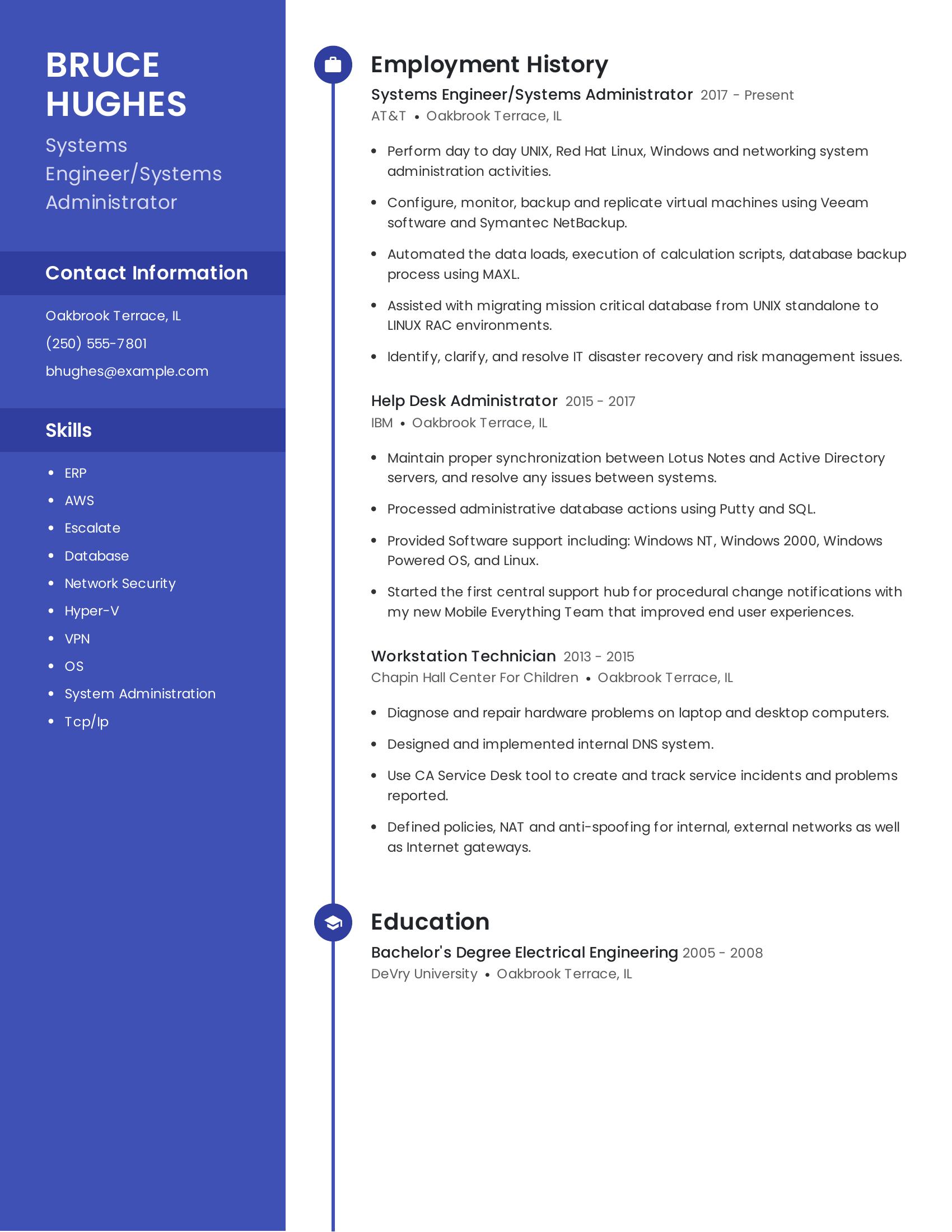
Infrastructure systems engineer resumes should highlight technical expertise, problem-solving skills, and relevant experience in managing and supporting IT infrastructure. Key elements include detailed descriptions of past job roles, specific technical skills like operating systems and network management, and achievements in optimizing system performance. Additionally, the resume should provide evidence of experience with various hardware and software installations, configuration, and maintenance.
This resume effectively includes these specifics by detailing roles at different companies where the candidate installed and maintained Windows operating systems, provided technical support, and managed servers. It lists relevant skills such as troubleshooting Linux tickets, handling helpdesk software applications, and supporting various operating systems. The candidate's experience with automating code and increasing trading capacity also demonstrates a proactive approach to improving system efficiency.
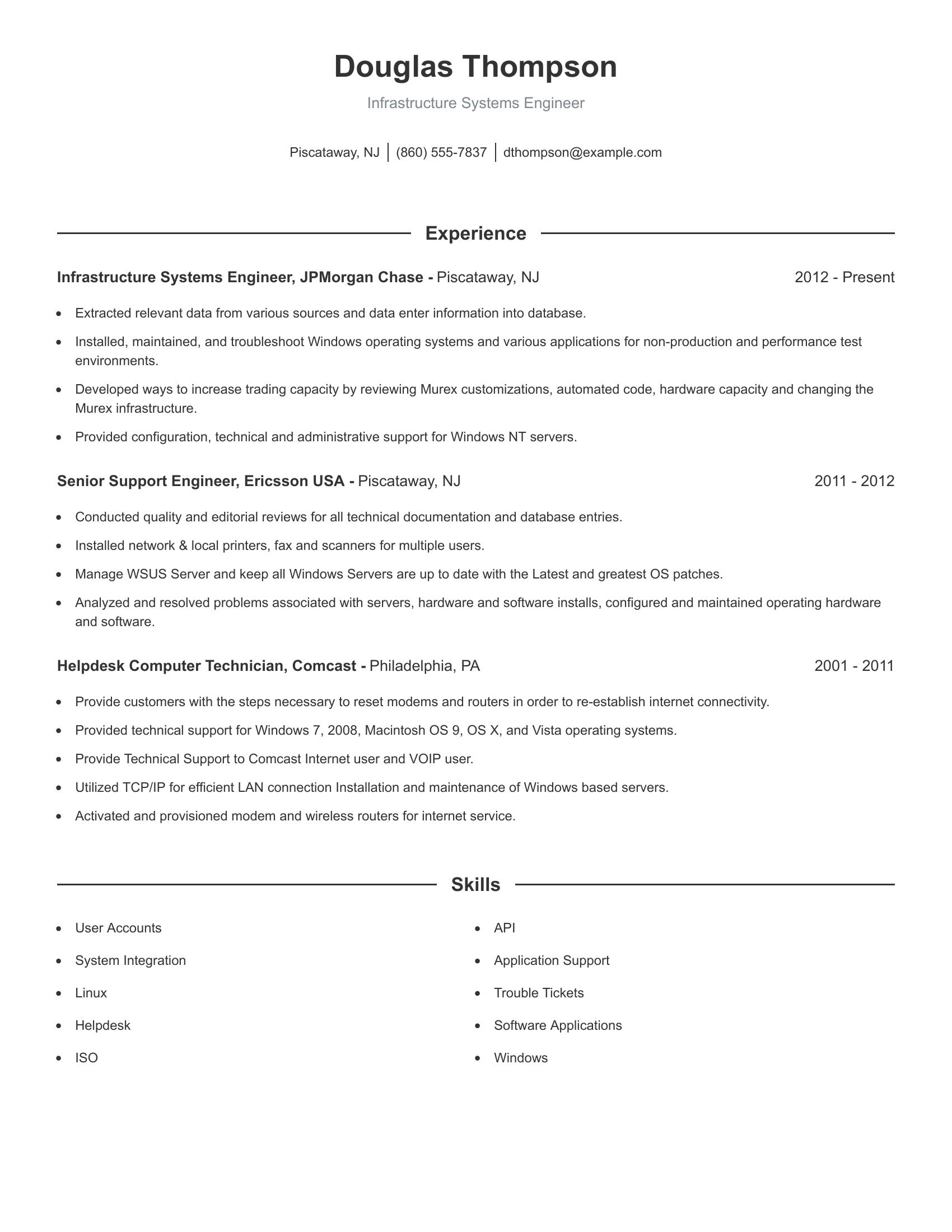
Systems administrator resumes should include contact information, work experience, skills, and education. The work experience section should highlight roles and responsibilities, focusing on technical skills and problem-solving abilities. Skills should be relevant to systems administration, such as troubleshooting, software support, and configuration management. Education should list degrees and institutions attended.
This resume includes detailed job experiences that describe specific tasks like configuring root disks on Linux and providing user support in Active Directory environments. It lists relevant skills such as infrastructure and cloud support. The education section is concise, mentioning degrees in business from a recognized university.
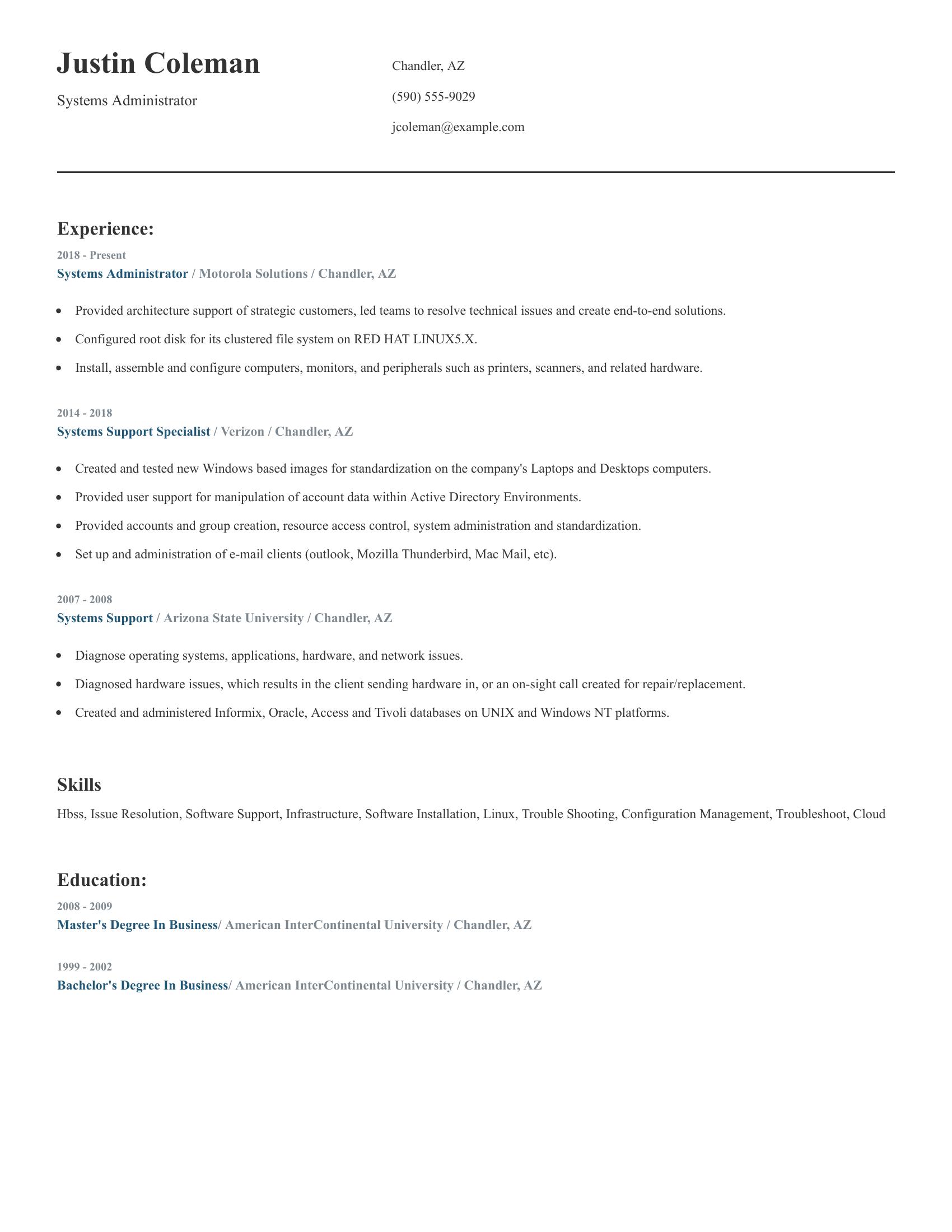
Systems integration engineer resumes should highlight technical skills, relevant work experience, and education. They need to show expertise in system integration, including both software and hardware knowledge. Strong resumes include specific job responsibilities, clearly indicating hands-on experience with systems administration, network management, and troubleshooting. Additionally, any leadership roles or projects should be mentioned to demonstrate the candidate's ability to handle complex tasks and collaborate with teams.
This resume includes detailed job experiences, showing work on LAN/WAN security, Linux and Windows admin accounts, and systems administration on various platforms. It outlines significant projects like integrating vehicle systems and supporting large user groups with Active Directory. The resume also lists technical skills such as LAN, VoIP, and TCP/IP. The education section provides relevant academic background in electrical engineering. This resume effectively covers critical aspects of a systems integration engineer's qualifications.
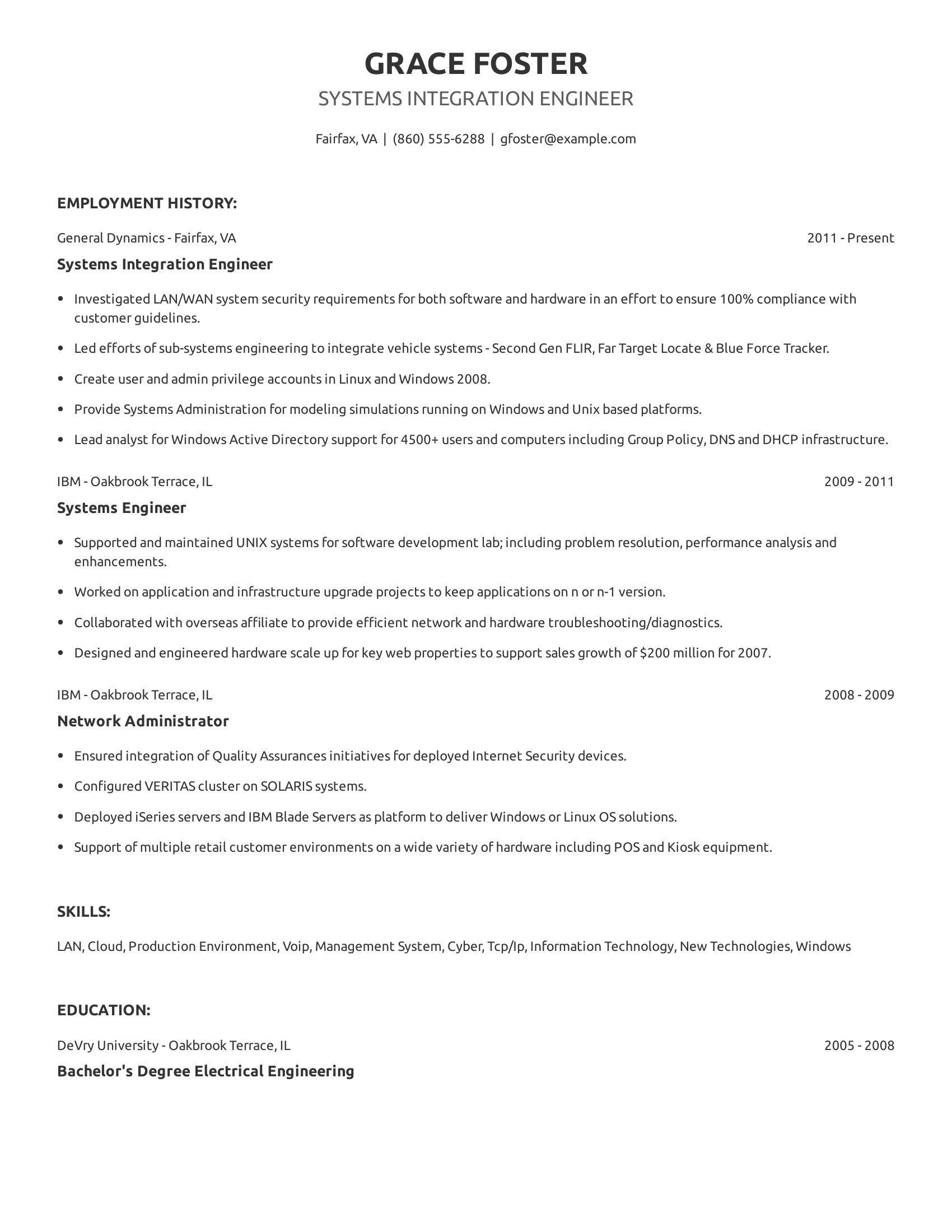
Computer systems engineer resumes should highlight relevant experience, technical skills, and education. Key elements include job titles, company names, locations, and dates of employment. Descriptions of job duties should focus on achievements and responsibilities directly related to systems engineering. Skills should be relevant to the field, and educational background should showcase degrees and institutions attended.
This resume includes specific job titles like computer systems engineer, computer technician student, and LAN administrator. It lists relevant companies such as IBM and HP. It details job responsibilities like troubleshooting hardware and software, server setup, and network support. Skills such as Windows OS and SharePoint setup are mentioned. The education section shows a degree in electrical engineering from a recognized university.
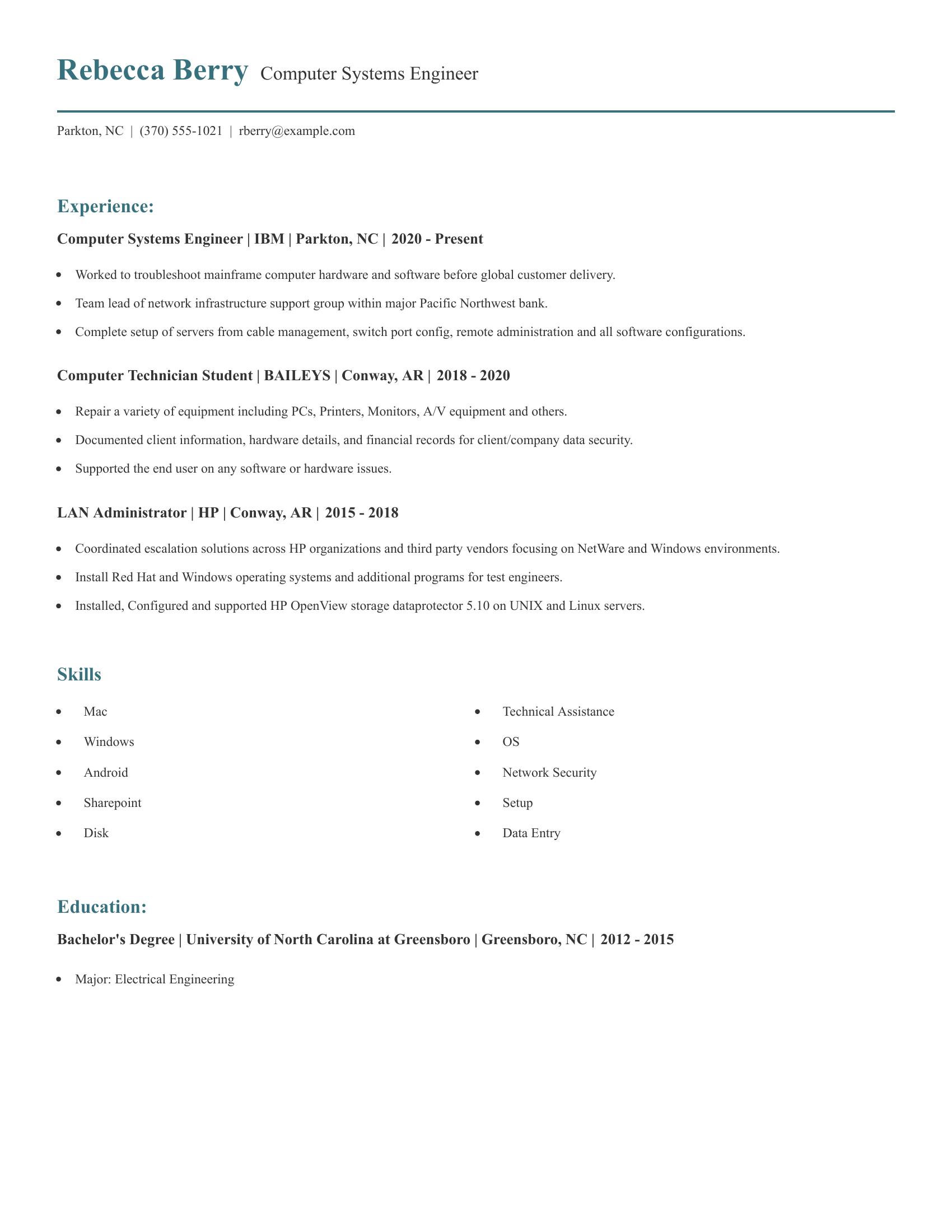
Senior systems support engineer resumes should highlight specific technical skills, relevant work experience, and notable achievements in system support roles. Important elements include experience with various operating systems, hardware and software troubleshooting, network management, configuration management, disaster recovery planning, and technical training. The resume should demonstrate a candidate's ability to manage complex IT environments and support end-users effectively.
This resume includes detailed work experience showcasing proficiency in Linux and Windows environments, system administration, and network setup. It highlights roles at several reputable companies, emphasizing duties such as disaster recovery testing, virus removal, and technical interviews. The skills section lists key technical capabilities like PowerShell and TCP/IP setup, which are crucial for a senior systems support engineer.
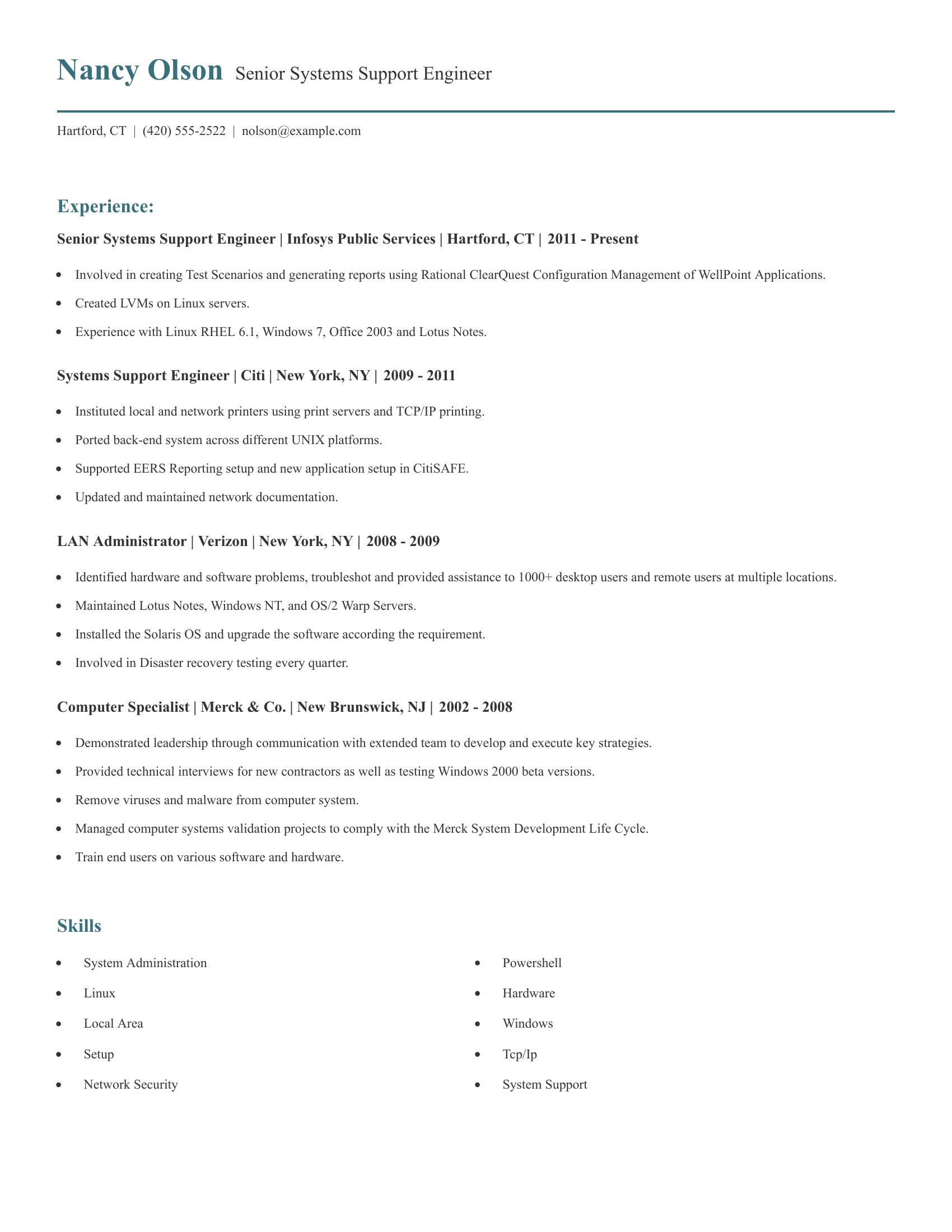
Senior lead systems engineer resumes should highlight extensive technical experience, leadership in system architecture, and proficiency in various software and hardware platforms. Key elements include a strong background in systems engineering, hands-on experience with configurations and installations, and a history of managing complex projects. Contributions to process improvements and achievements in cost reduction or efficiency gains also make a resume stand out.
This resume showcases significant experience at multiple companies, demonstrating a clear career progression. It includes detailed descriptions of technical tasks such as resetting user passwords, installing Unix systems, and developing LDAP architectures. The resume also highlights leadership skills by noting achievements like sustaining CMMI Maturity Level 5 and integrating commercial hardware to reduce lifecycle costs. Additionally, it lists relevant skills such as XML, Javascript, and information security.
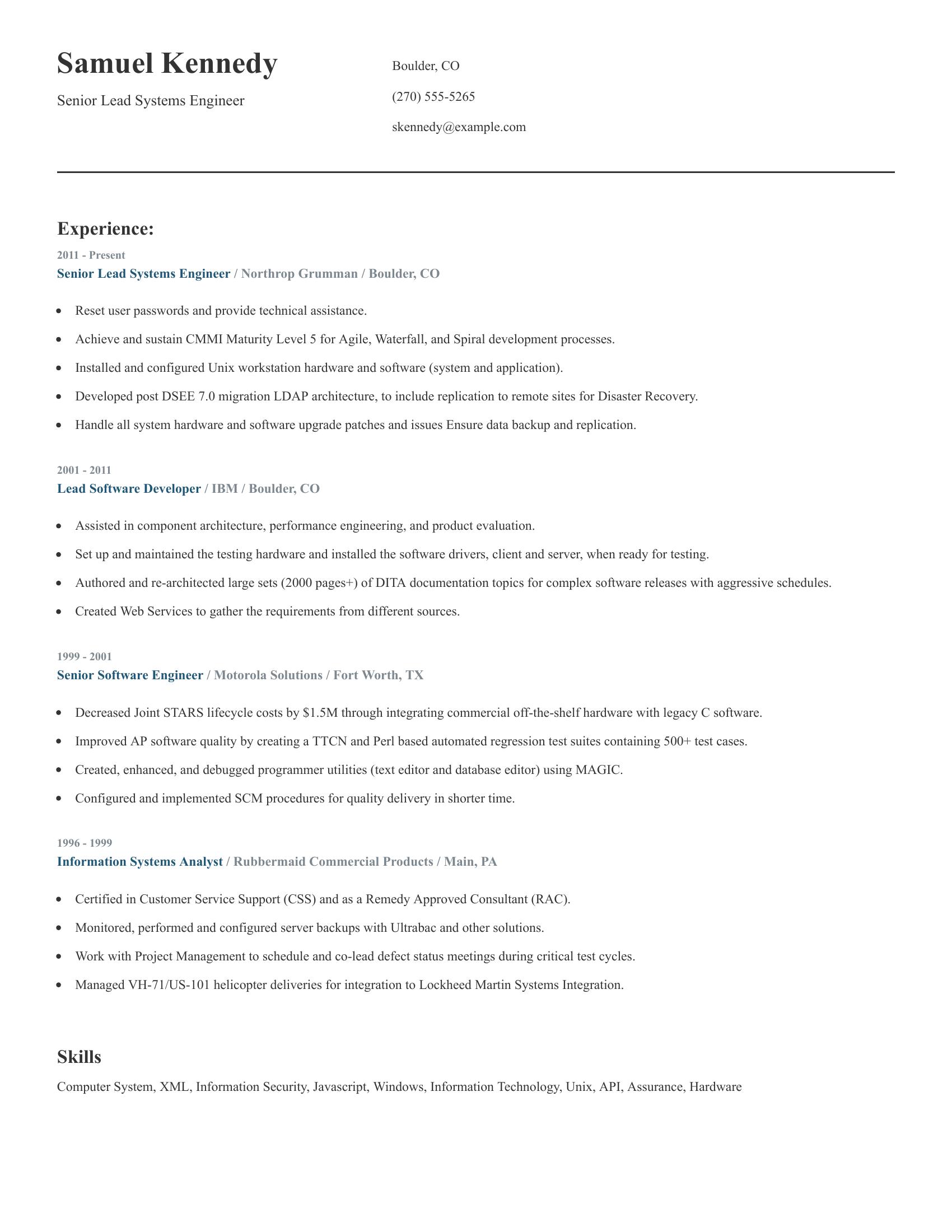
A good lead systems engineer resume highlights extensive experience with system administration and engineering, familiarity with various operating systems and databases, and leadership in project management. It should list specific technical skills, such as proficiency with SQL, Unix, Microsoft platforms, and various programming languages. Clear documentation of employment history showing progressive responsibility is important, as are examples of successful project involvement and problem-solving abilities.
This resume includes many strong points that align with the criteria for a good lead systems engineer resume. It details a robust employment history with roles at well-known companies like Infosys Public Services, Lockheed Martin, Robert Half International, and Microsoft. Each job entry lists specific responsibilities and technologies used, such as SQL Server 2008, Digital OpenVMS, Unix, NT, and various SAS tools. The skills section further complements the work history by listing relevant technical proficiencies like database management, VPN setup, and Active Directory.
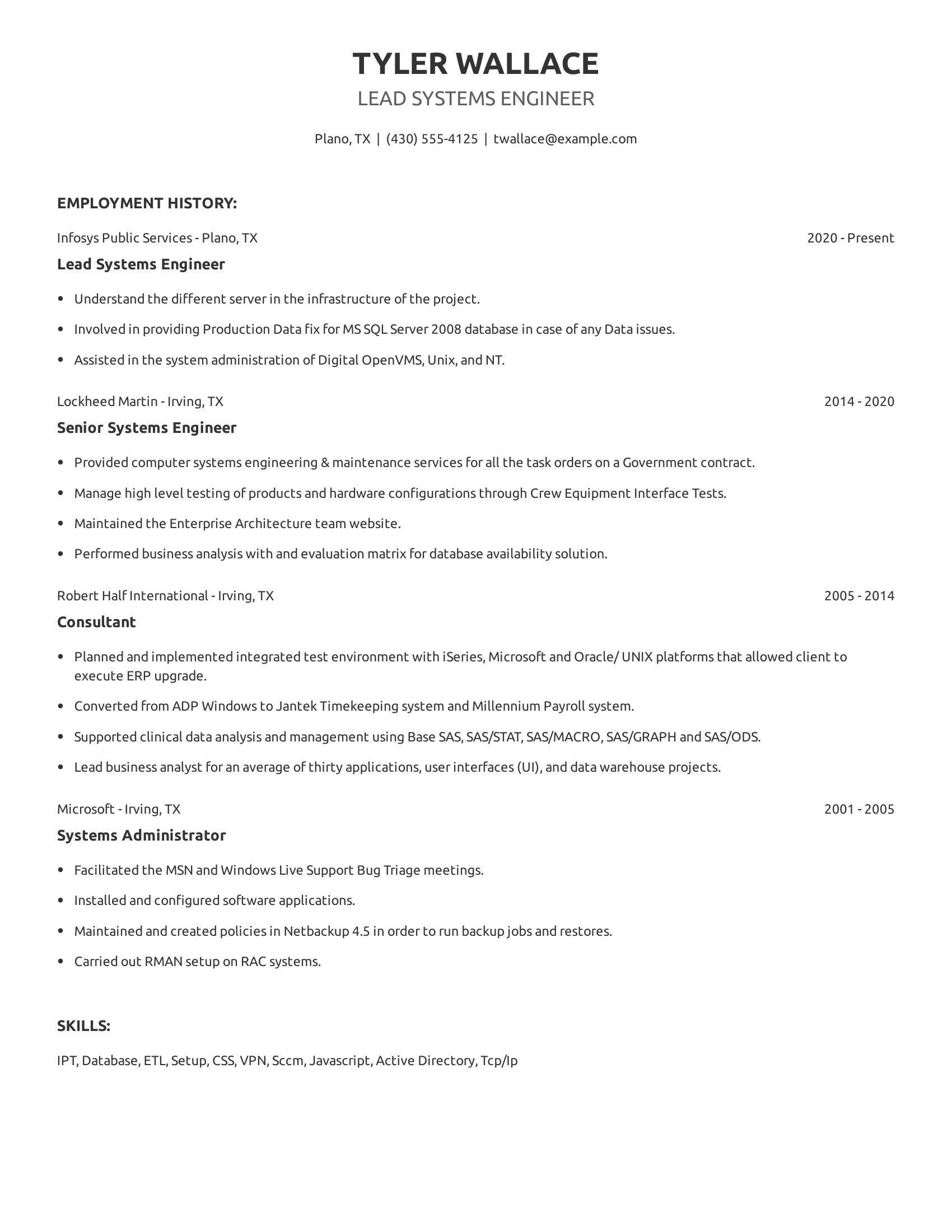
Infrastructure engineer resumes should highlight hands-on experience with network and system management, proficiency in various operating systems, and experience with cloud services. They should detail specific projects showing technical skills, such as designing and implementing infrastructure, supporting devices, and performing system upgrades. Educational background and relevant certifications also add value.
This resume includes detailed job experiences like designing a Corporate PKI infrastructure and working on Android/Linux BSP migration. It lists specific tasks such as creating Active Directory infrastructures and maintaining hardware. The resume also covers a range of skills from software applications to cloud services, and notes the candidate's education in computer science.
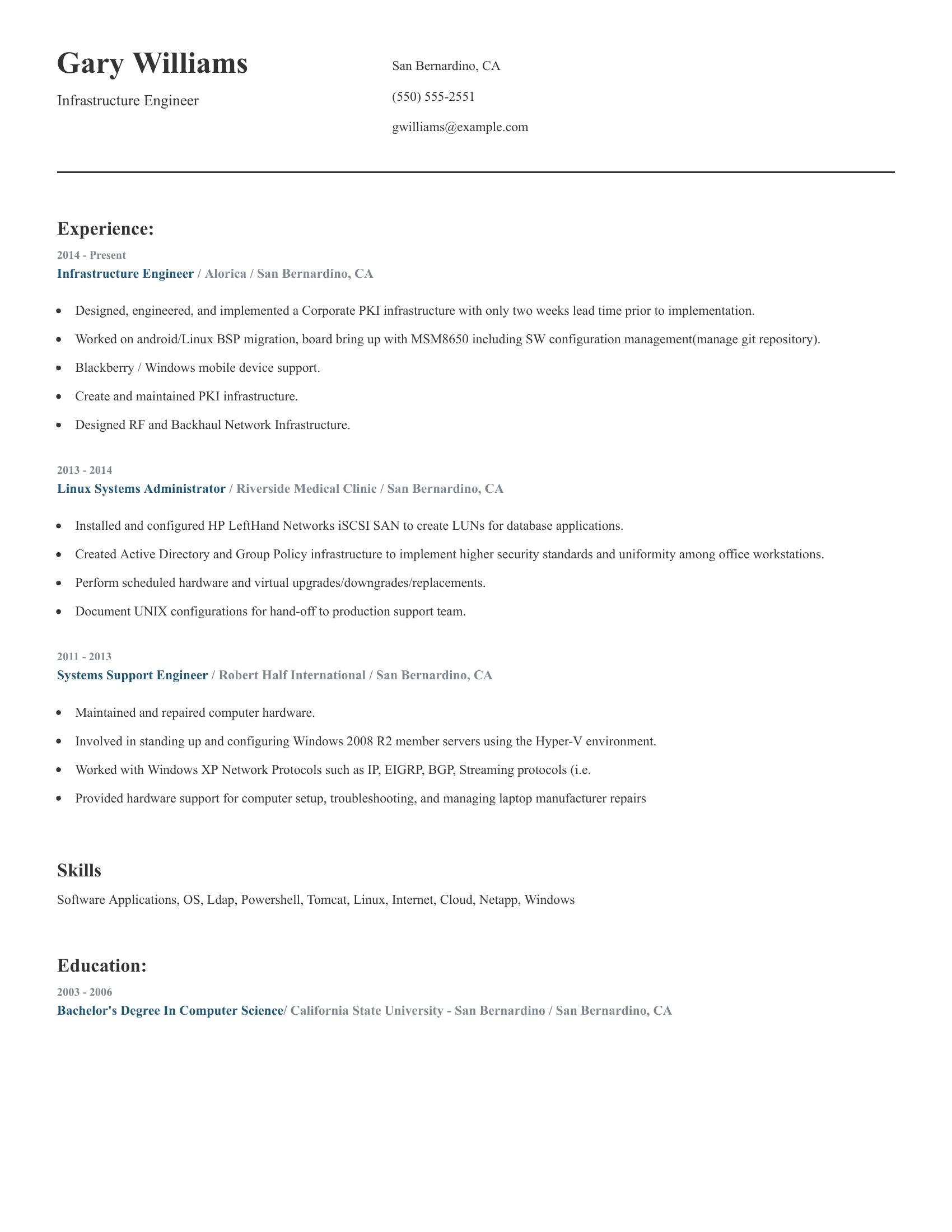
Information engineer resumes should include clear job titles, employment history with dates, and specific responsibilities. They should also highlight technical skills, education, and contact information. A strong resume shows experience with relevant software and hardware, problem-solving abilities, and collaboration with teams.
This resume includes specific job titles and dates, showing a clear career progression. It lists concrete responsibilities like providing support for OS/2 and Windows platforms and configuring network security appliances. The resume also includes technical skills such as network security and system support. Education details are concise, and contact information is provided.
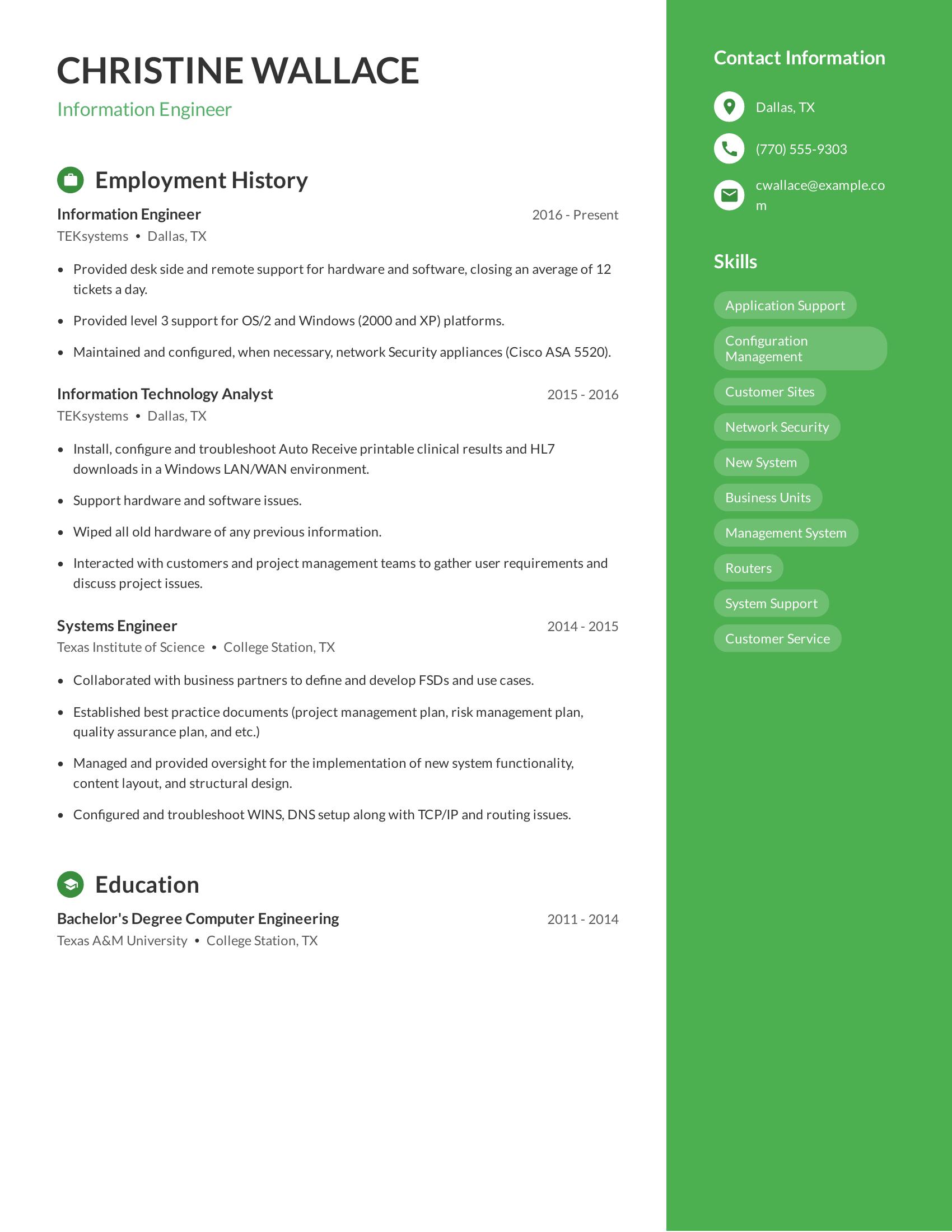
Systems consultant resumes should highlight technical skills, relevant work experience, and specific project contributions. They should also list contact information prominently and include a clear employment history. Skills related to systems management, network security, and software development are fundamental. Resumes should demonstrate experience with various technologies and platforms like AWS, Linux, and Windows.
This resume includes detailed job roles and responsibilities, showcasing hands-on experience with system configurations, network security, and hardware troubleshooting. The candidate lists specific skills such as management systems and PHP development. The employment history outlines progressive roles from LAN administrator to systems consultant, reflecting career growth. Relevant technical projects, including application development and system deployments, are also mentioned.
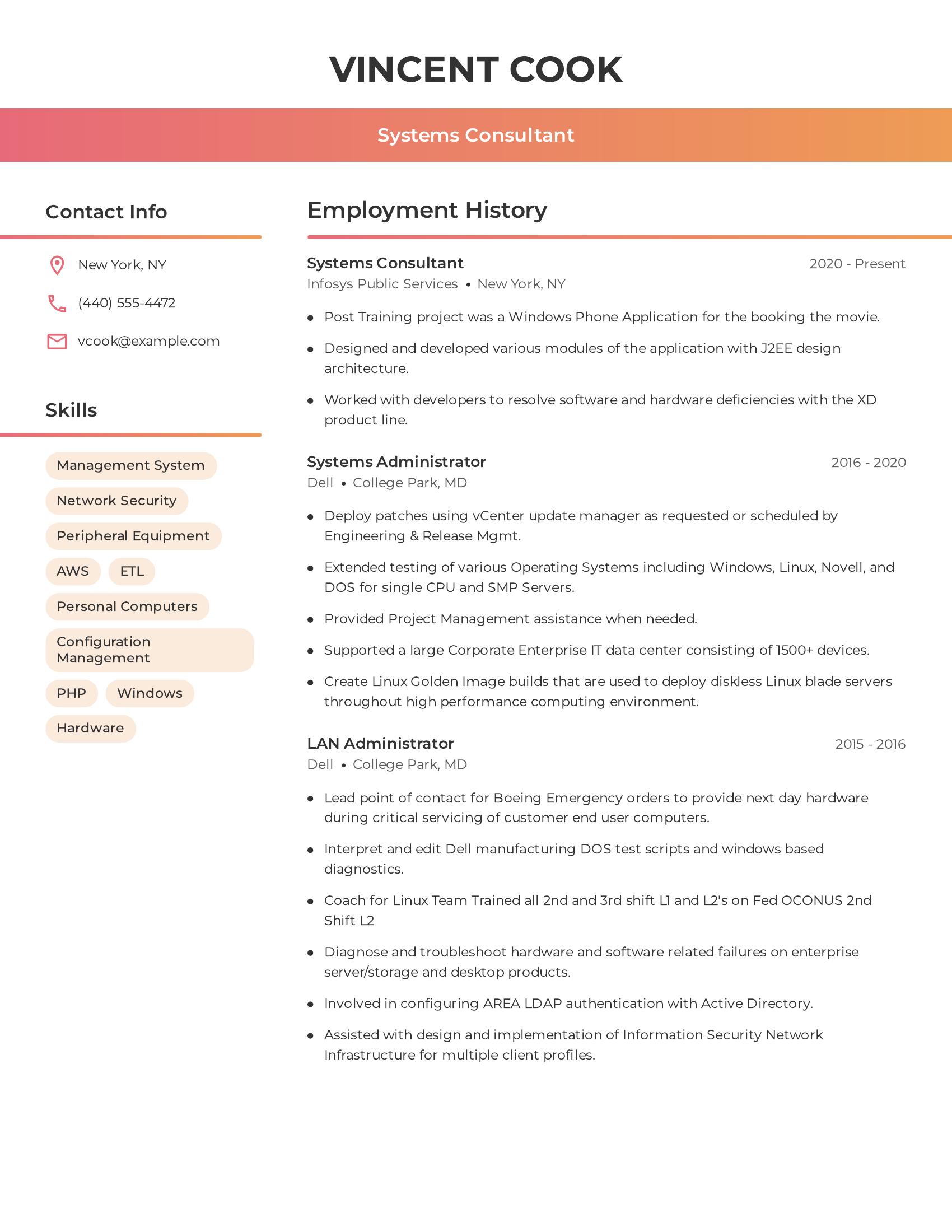
Systems engineer and team lead resumes should highlight technical expertise, leadership abilities, and experience in managing projects. Key elements include detailed job responsibilities, specific achievements, and relevant technologies or methodologies used. The resume should showcase progression in roles, demonstrating growth and increased responsibilities over time.
This resume includes these specifics by listing detailed job duties and projects at each position held. It mentions specific tasks like writing security correspondence, supporting VTC equipment, updating servers, and developing secure environments. Additionally, it shows career progression from staff engineer to systems engineer and team lead, indicating a track record of increasing responsibility.
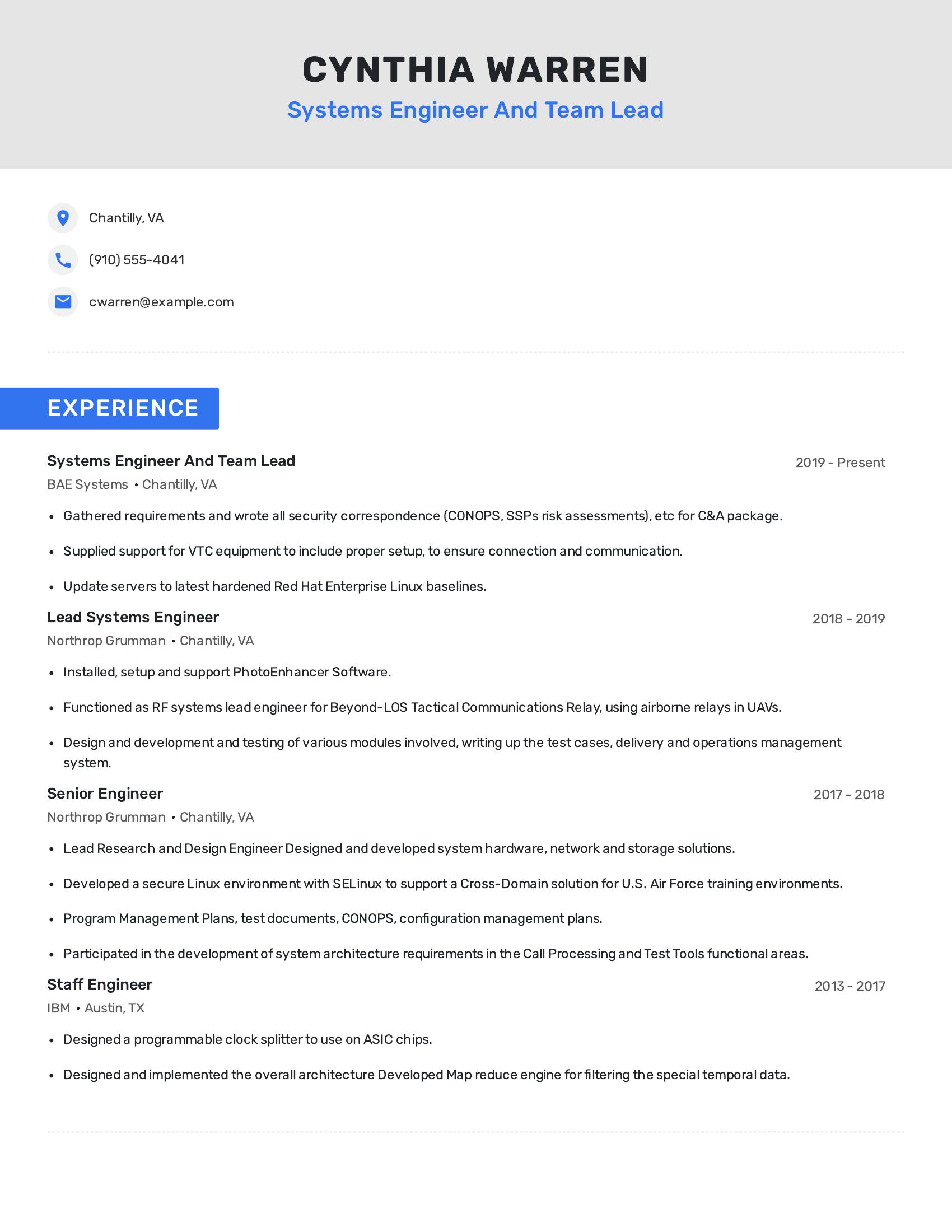
Highlight technical skills. List specific tools and technologies you have used, like Linux, AWS, or Docker. Mention any programming languages you know, such as Python or Java.
Show project experience. Describe your role in projects. Explain your contributions to system design, implementation, or maintenance. Mention any improvements you made.
Include certifications. Add relevant certifications like Cisco CCNA, CompTIA Security+, or AWS Certified Solutions Architect. These show your qualifications and commitment to the field.
A systems engineer's resume should highlight technical skills, relevant experience, and certifications. Include a clear summary, professional experience, education, and technical skills sections.
A good systems engineer summary should highlight technical skills and experience. Mention your expertise in specific technologies, programming languages, and methodologies.
Your summary should be clear and focused. Tailor it to the job you are applying for by including keywords from the job description.
Focus on job responsibilities, technologies used, and measurable achievements.
Use clear language and focus on results.
Systems engineers need technical skills to design, analyze, and manage complex systems.
Systems engineers also need soft skills to work well with teams and manage projects.